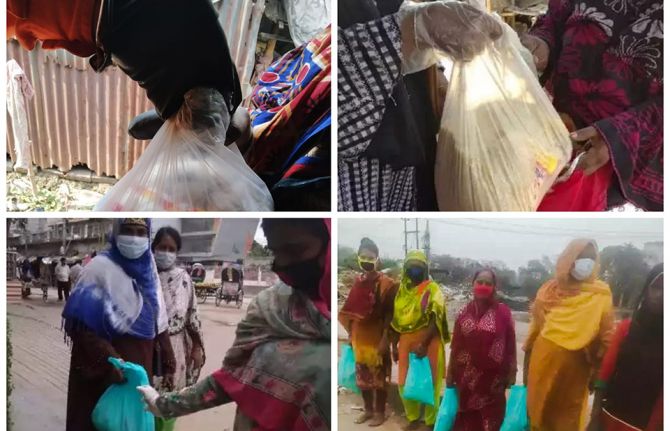

Feature Story
Sex workers in Bangladesh: building resilience during the COVID-19 pandemic
13 May 2020
13 May 2020 13 May 2020Shahnaz Khatun (not her real name), a former sex worker now running a small clothing business in Dhaka, Bangladesh, found herself in difficulties when the country went into lockdown. Before the COVID-19 outbreak, the areas where she used to work were crowded, but now they are quiet. Ms Khatun is self-isolating in response to the government’s call, but she is unable to provide for herself and her family. “My business is now out of action due to the restrictions on movement. I have some underlying health conditions and I spent all my money on buying medicines,” she said.
As a result of the COVID-19 pandemic, sex workers in Bangladesh, like other informal sector workers, are experiencing hardship and a loss of income. With the limited support that some of them get, they can barely feed themselves and their children. Only a few of them have savings to fall back on and little access to services that could bring some relief. Conditions are more vulnerable for street-based sex workers, as most of them are homeless.
However, sex workers in Bangladesh are organizing themselves, establishing support networks to help their peers. The Bangladesh Sex Workers Network, a nongovernment organization working for the rights of sex workers, mobilized financial aid for more than 2100 sex workers across the country that was distributed through the active engagement of 26 community-based organizations. “Many sex workers have chosen this profession for the sake of their families or children, to provide them with food and a livelihood. Today, sex workers’ families are passing their days helplessly with no money in their pocket,” explains Ms Kajol, President of the Sex Workers Network of Bangladesh.
Ms Khatun received 10 000 Bangladeshi taka, equivalent to US$ 120, through the Bangladesh Sex Workers Network. “With this, I also bought food for another 30 sex workers. I am also arranging for delivery of masks, soap and food to other sex workers in my area and am teaching them about hand washing techniques, maintaining personal hygiene and social distance maintenance,” she said.
Ankhi Akhter (not her real name), who works in a brothel in Tangail, gives support for mental health issues to her peers and encourages regular communication among sex workers in order to cope with stress and to exchange thoughts. “The local governmental authority and a number of nongovernmental organizations, as well as private entities, have already helped us with food and a limited amount of money,” she said. “However, these will not be sufficient if the situation continues.”
As a result of Ms Akhter’s efforts, the Dhaka District Council Office and the Member of Parliament representing the district donated food to the brothel and distributed it among a network of 500 sex workers. The Society for Social Service, a local nongovernmental organization, offered cash payments to more than 400 sex workers and landlords postponed utility bills, such as rent, electricity and water. Most of the sex workers in the brothel received masks, soap and hand sanitizer from the brothel and volunteer organizations.
Sweety Begum (not her real name) is the leader of a community-based organization that supports street-based sex workers in Rajshahi. She relies on her husband's limited income for their living expenses and is helping other sex workers with the small amount of financial help she receives. “Street-based sex workers outside Dhaka are getting less help than those in Dhaka and they are scared to collect aid because of stigma and discrimination,” she said.
“Eleven brothels in Bangladesh have received food and some financial support from government organizations: however, this is not enough. In some areas, relief has been provided only to those who have a national identity card and, unfortunately, not all sex workers have this,” says Saima Khan, UNAIDS Country Manager for Bangladesh.
UNAIDS and the United Nations Children’s Fund have been supporting the network of sex workers to develop income-generating schemes so they can compensate for the loss of income caused by COVID-19. Also, through the network of sex workers and in collaboration with the Bangladesh Country Coordinating Mechanism, UNAIDS has supported 23 community-based organizations of sex workers to procure protective commodities such as soap and masks during the initial stages of the response to COVID-19. Advocacy with organizations to make access to aid easier for sex workers is also ongoing.
“The Sex Workers Network of Bangladesh, through collective efforts, will continue to work hand in hand, so that sex workers can fight back against any difficult situation they face together, leaving no one behind,” said Ms Kajol.



